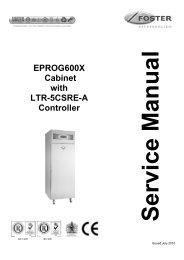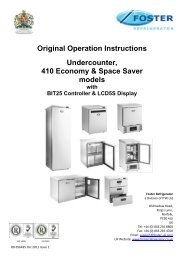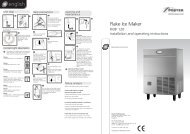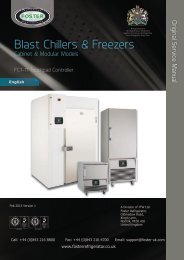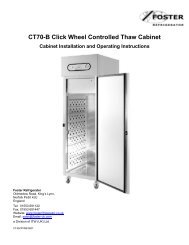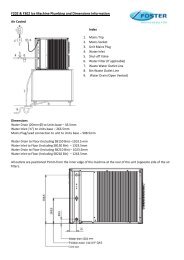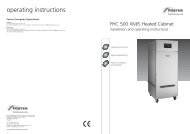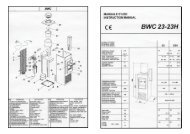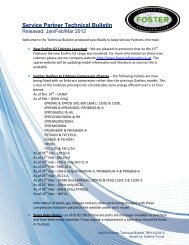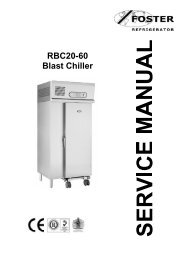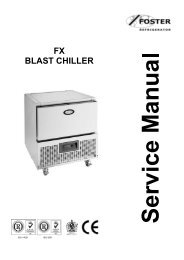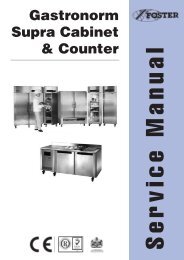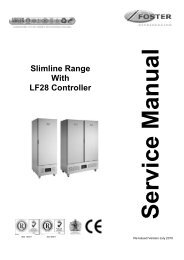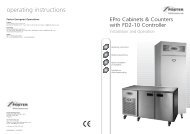Gastronorm Roll-in Cabinets S.M.indd
Gastronorm Roll-in Cabinets S.M.indd
Gastronorm Roll-in Cabinets S.M.indd
Create successful ePaper yourself
Turn your PDF publications into a flip-book with our unique Google optimized e-Paper software.
7.2.6 Compressor replacement<br />
Remove the unit cover as described <strong>in</strong> 7.2.1. To give more access the side panels can be removed by releas<strong>in</strong>g the four<br />
screws. Reclaim the refrigerant. Disconnect all electrical connections. On satisfactory reclamation of the refrigerant<br />
disconnect the pipework from the compressor and tape the ends of the pipes to avoid moisture <strong>in</strong>gress <strong>in</strong>to the system. It<br />
is important to note that the compressor manufacturers recommend that the replacement should be completed with<strong>in</strong> fifteen<br />
m<strong>in</strong>utes to avoid moisture <strong>in</strong>gress. With the pipes disconnected remove the four bolts secur<strong>in</strong>g the compressor to the base<br />
plate and remove it. Fit the anti-vibration rubber mounts to the compressor prior to re-<strong>in</strong>stallation ensur<strong>in</strong>g that the metal<br />
spacers are fitted correctly. Locate the bolts <strong>in</strong>to the threaded nutserts and tighten. Remove the tape from the ends of the<br />
pipes and reconnect the pipework. It is good refrigeration practice to replace the drier when replac<strong>in</strong>g component parts <strong>in</strong><br />
the refrigeration system. Evacuate the system and charge with the correct amount of gas as shown <strong>in</strong> the technical data.<br />
Reconnect all electrical connections. Once the system has been regassed check for leaks. When satisfied replace all covers<br />
ensur<strong>in</strong>g they are all fitted correctly.<br />
7.2.7 Condenser fan replacement<br />
Remove the unit cover as described <strong>in</strong> 7.2.1. To give more access the side panels can be removed by releas<strong>in</strong>g the four<br />
screws. Disconnect the fan cables from the compressor term<strong>in</strong>al box located on the right hand side of the unit compartment.<br />
Remove the four screws secur<strong>in</strong>g the grid mount fan motor to the condenser. Reverse the procedure for replac<strong>in</strong>g the fan<br />
ensur<strong>in</strong>g that all screws and covers are fitted tightly and securely.<br />
7.2.8 Condenser replacement<br />
Remove the unit cover as described <strong>in</strong> 7.2.1. To give more access the side panels can be removed by releas<strong>in</strong>g the four<br />
screws. Reclaim the refrigerant gas. Remove the grid mount fan motor from the condenser. On satisfactory reclamation of<br />
the gas disconnect the pipework from the condenser and tape the ends of the pipes to avoid moisture <strong>in</strong>gress <strong>in</strong>to the system.<br />
It is important to note that the compressor manufacturers recommend that the change over should be completed with<strong>in</strong> fifteen<br />
m<strong>in</strong>utes to avoid moisture <strong>in</strong>gress. Once the pipes have been disconnected undo the screws secur<strong>in</strong>g the condenser to the<br />
base plate and remove it. Fit the replacement condenser. Remove the tape from the ends of the pipes and reconnect the<br />
pipework. It is good practice to replace the drier when replac<strong>in</strong>g component parts <strong>in</strong> the refrigeration system. Evacuate the<br />
system and charge with the correct amount of gas as shown <strong>in</strong> the technical data. Refit the fan. Once the system has been<br />
regassed check for leaks. When satisfied replace all covers ensur<strong>in</strong>g they are all fitted correctly.<br />
7.2.9 Complete refrigeration plug replacement<br />
Remove the unit cover as described <strong>in</strong> 7.2.1. To give more access the side panels can be removed by releas<strong>in</strong>g the four<br />
screws. Remove the air duct as described <strong>in</strong> 7.2.3. Remove the brackets located to the rear of the return air duct, secured<br />
by four screws <strong>in</strong> each. The front of the plug is secured externally. The plug is secured to the top of the cab<strong>in</strong>et, via an angle<br />
attached o the front edge of the plug box. A strip of white foam tape is stuck to the top of the cab<strong>in</strong>et to provide a vapour seal.<br />
The complete plug can now be removed from the cab<strong>in</strong>et tak<strong>in</strong>g care not to damage the foam material. It is recommended<br />
that at least three people carry out this procedure. Reverse the procedure to fit the replacement tak<strong>in</strong>g care that the vapour<br />
seal is not damaged ensur<strong>in</strong>g that all screws and covers are fitted tightly and securely.<br />
18



